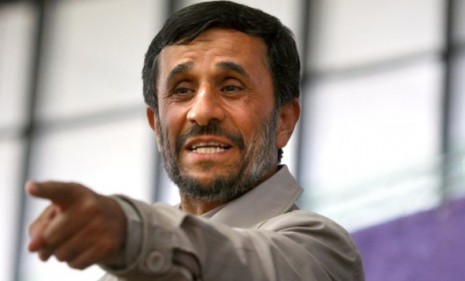Ahmadinejad in New York: A controversy timeline
Iran's media-hungry president never fails to create a stir when he visits the United Nations

A free daily email with the biggest news stories of the day – and the best features from TheWeek.com
You are now subscribed
Your newsletter sign-up was successful
Last week, in what has become an autumn tradition of sorts, Iranian president Mahmoud Ahmadinejad made a series of inflammatory statements at the UN's annual gathering of world leaders. This time around, he provoked the American delegation to walk out on his speech by suggesting that "some segments within the U.S. government orchestrated the (Sept. 11) attack" as license to pursue an aggressive international agenda. Here's a timeline of the provocative rhetoric he's deployed during his visits to America:
September 2005
In his first visit to the U.S., fresh off his victory in Iran's presidential elections, the largely unknown leader displays a "dash of defiance," calling American forces "the occupiers" of Iraq and criticizing the Bush administration's inept response to Hurricane Katrina. He then gives an "unyielding" speech at the UN in which he accuses the U.S. of trying to split the world between "light and dark" countries, and compares plans to reduce Iran's nuclear-energy program to "apartheid."
The Week
Escape your echo chamber. Get the facts behind the news, plus analysis from multiple perspectives.

Sign up for The Week's Free Newsletters
From our morning news briefing to a weekly Good News Newsletter, get the best of The Week delivered directly to your inbox.
From our morning news briefing to a weekly Good News Newsletter, get the best of The Week delivered directly to your inbox.
September 2006
Appearing before the Council of Foreign Relations, Ahmadinejad questions whether the Holocaust happened. "I think we should allow more impartial studies to be done on this," he says after hearing testimony from a Dachau liberator.
September 2007
In his most widely publicized visit yet, Ahmadinejad accepts an instantly controversial invitation to speak at Columbia University. Introduced as "either brazenly provocative or astonishingly uneducated" by University president Lee Bollinger, Ahmadinejad makes his fair share of incendiary statements during his allotted time. Most notoriously, he claims that, "We in Iran, we don't have homosexuals, like in your country." In his annual UN speech, Ahmadinejad doesn't let up, railing against unspecified "arrogant powers" who practice "obedience to Satan."
A free daily email with the biggest news stories of the day – and the best features from TheWeek.com
September 2008
Ahmadinejad is not invited back to Columbia, but he doesn't disappoint at the UN, claiming that "a small but deceitful number of people called Zionists" dominate decision-making in the West, and predicting an American defeat in Afghanistan.
September 2009
Sounding a familiar theme, Ahmadinejad calls Israel the "most cruel and racist regime," provoking walkouts from many European delegations.
May 2010
At a meeting of the United Nations' Nuclear Non-Proliferation Treaty Review Conference, multiple delegations leave the room after Ahmadinejad makes reference to "major terrorist networks" that enjoy the support of "United States Intelligence agencies, and the Zionist regime."
September 2010
In Ahmadinejad's latest speech, he levels what may be his most incendiary charge yet: That the U.S. government might be behind the September 11 attacks. He also declares that "the discriminatory order of capitalism and the hegemonic approaches are facing defeat and are getting close to their end." Ahmadinejad earns a rebuke from President Obama, who calls his remarks "hateful" and "offensive."
Sources: The New York Times, The Washington Post, Gothamist, The Guardian
-
 How the FCC’s ‘equal time’ rule works
How the FCC’s ‘equal time’ rule worksIn the Spotlight The law is at the heart of the Colbert-CBS conflict
-
 What is the endgame in the DHS shutdown?
What is the endgame in the DHS shutdown?Today’s Big Question Democrats want to rein in ICE’s immigration crackdown
-
 ‘Poor time management isn’t just an inconvenience’
‘Poor time management isn’t just an inconvenience’Instant Opinion Opinion, comment and editorials of the day